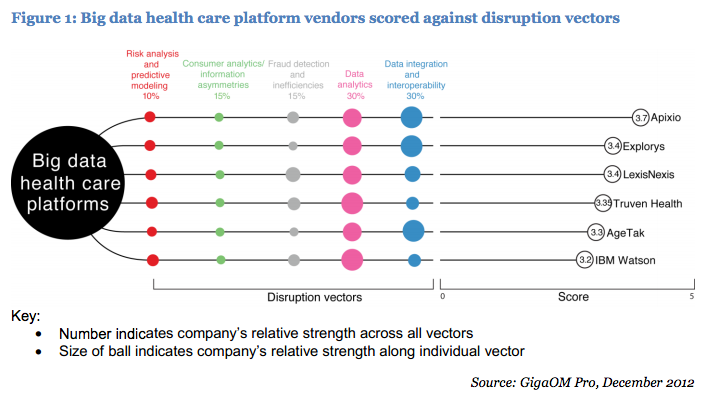Table of Contents
- Summary
- Introduction
- Health care and big data today
- Uses of big data in health care: health-sector segmentation
- Trends and drivers for big data and analytics in health care
- Challenges for big data in the health care space
- Vectors for analysis
- Companies to watch
- Conclusion
- Appendix A: extended vendor analysis
- About Jody Ranck
- About GigaOm
- Copyright
1. Summary
The U.S. health care system is at a turning point where opportunities for big data and data analytics firms are likely to expand dramatically in the coming years. Key drivers of the opportunity spaces for big data in health care include:
- The Patient Protection and Affordable Care Act and the creation of accountable care organizations (ACOs) will require robust data analytics for both clinical and financial success in the coming years.
- Inefficiencies, fraud, and waste have become hot-button issues in the current financial crisis, and big data can play a major role in driving performance improvements that address these issues.
- The rapid growth of m-health and other digital-health platforms including M2M means that the data deluge will become a serious challenge if big data tools are not adopted.
- Open-data policies espoused by the U.S. Department of Health and Human Services are driving a new wave of innovative startups that address the information asymmetries and lack of transparency in health care markets.
- Health care will be personalized and customized in the coming years as genomics and sensor data as well as advances in the health-research sciences make personalized medicine more practical.
This Sector RoadMapTM explores these drivers and looks at a sample of the companies that are making the first forays into the area of big data in health care. We also examine some of the barriers that make health data a difficult challenge for many mainstream big data firms. It’s a major issue that 80 percent of all data in health care is unstructured. Strict data-privacy laws and the particularities of the organization of the health care system have made silos and health enterprise data management difficult to tackle. Nonetheless, we are already seeing important insights from early ventures that offer great promise for addressing some of the most important organizational challenges in health care as well as basic research.
